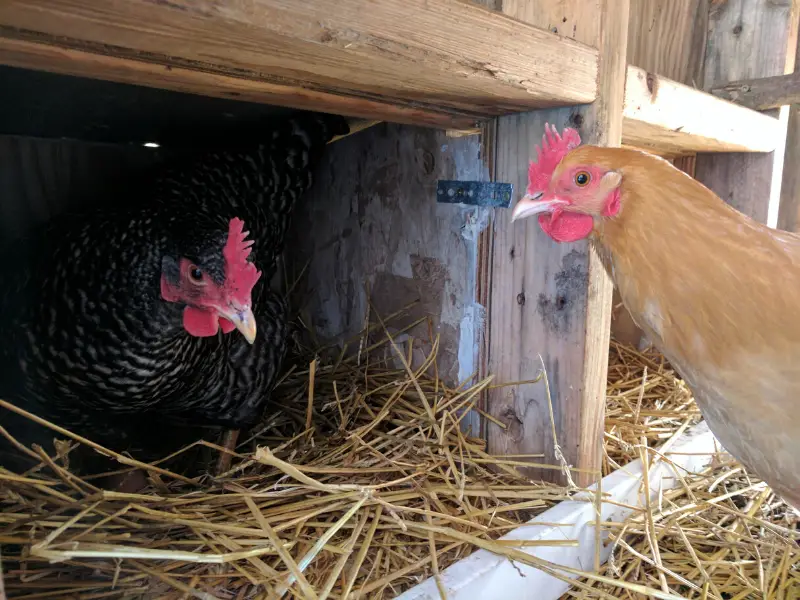Chickens are a great flock to add to any farm or backyard since they are easy to maintain and lay great eggs. But for some reason, they have stopped laying eggs or are only laying a few, compared to previous weeks. There can be many different reasons for this, some more serious than others.
There is no set reason your chicken is not laying eggs, but rather multiple different reasons, and addressing the issues is the best way to ensure a healthy flock. The reasons range from age and food to the amount of daylight and stress they receive, with each issue vital to egg-laying.
There are many factors that impact whether or not your chicken will lay eggs. Today, the goal is to detail seven reasons that your chicken might not be laying eggs and, hopefully, help you solve the problem.
Main Reasons Why Your Chicken Is Not Laying Eggs
What should you do if your seemingly healthy chicken has stopped laying eggs? There can be many different reasons for this, some simple and some more serious. By knowing the age and dietary habits of your chicken, you can start to understand what the reason might be.
Another common reason is an unclean pen. Maintaining a healthy and clean pen is one of the easiest ways to ensure healthy egg-laying chickens. Even if you are just using it as a preventative measure, ensure that your chickens living environment is always clean and comfortable.
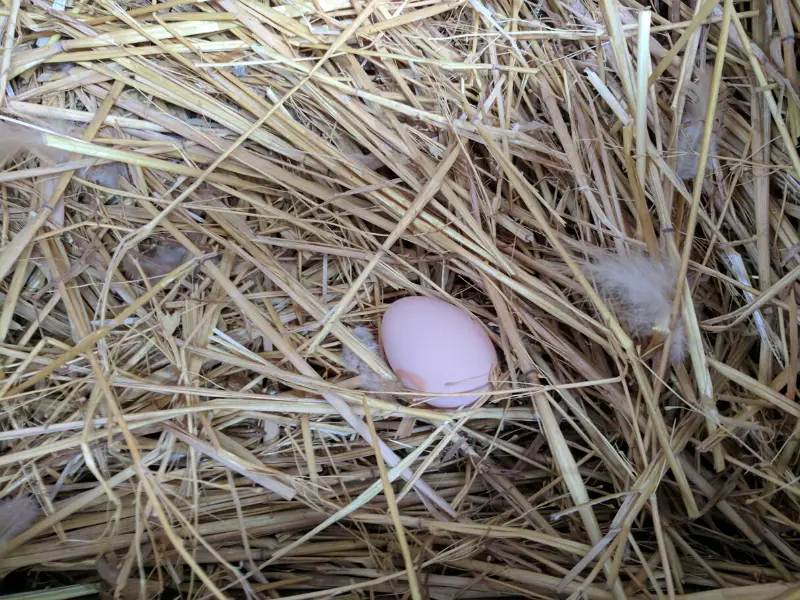
1. Age of the Chicken
If your hen is too young or old, she might only lay a few eggs, if any. It is somewhere between 18 and 20 weeks that a chicken will start laying her first eggs. From that moment on, hens can lay eggs for nearly their entire lives. With chickens living between 8 and 10 years, that is a lot of eggs to be laid.
Even after a hen has stopped laying eggs, she will still be important for the coop. Retired hens tend to take leadership roles, showing the new hens valuable skills and helping maintain a healthy flock and happy flock, which is important for the egg-laying of other hens.
During their first year of egg-laying, hens will lay more eggs than at any other point in their life, and every year following will show a decline in egg production. Each year, the percentage of eggs laid decreases somewhere between 10 and 15 percent. Nothing can be done about the decrease, as it is a natural process. We currently have two hens that are 5 years old and still lay fairly consistently.
2. Nutrient Intake
When a hen is not getting enough nutrition from their diet, they might lay fewer eggs or stop laying eggs altogether. Egg-laying hens need high amounts of calcium and protein in their diet to lay strong shelled eggs. Decreased calcium levels can cause weak eggshells, which break once laid or when handling.
To ensure your hen is getting enough calcium, you can give them oyster shells or bones, both of which can provide calcium. Placing this nutritional food in a side dish near their normal food so that they can peck at it is a great option. Many farming stores sell bagged oyster shells for chickens, making it easy to give them this supplement.
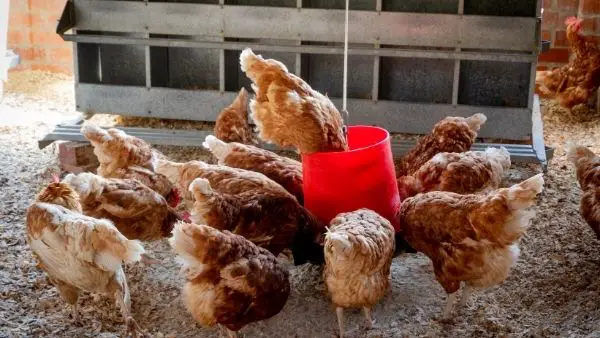
Chickens need around 4 grams of protein each day to support their egg-laying. However, many commercial chicken feeds do not contain this amount. A great way to make sure your hens are getting this is by giving them snacks, such as:
- Nuts and seeds
- Bugs
- Fish
Chickens need carbohydrates and fats in their diet as well. Carbohydrates can be found in grain-based feed, while fat can be found in animal fat or poultry fat. All of these nutrients are required to ensure healthy chickens, but how you go about adding them into their diet is up to you.
3. Amount of Daylight
During the winter season, when there is decreased sunlight, your hen will naturally slow down their egg production. It is ideal for chickens to get 14 hours of sunlight a day, with some farmers believing 16 hours is best. During the summer, achieving these hours of light is no issue, but in the winter, it is not possible in many regions.
There are options to bring in artificial light or UV light to help mimic the sun to get those additional hours. However, many farmers do not use this method, as it is believed that hens use the winter to rest and recover their bodies from the past year of laying. Rest is important because overworking chickens can lead to long term health issues. We do not force laying with artificial light here on our homestead.
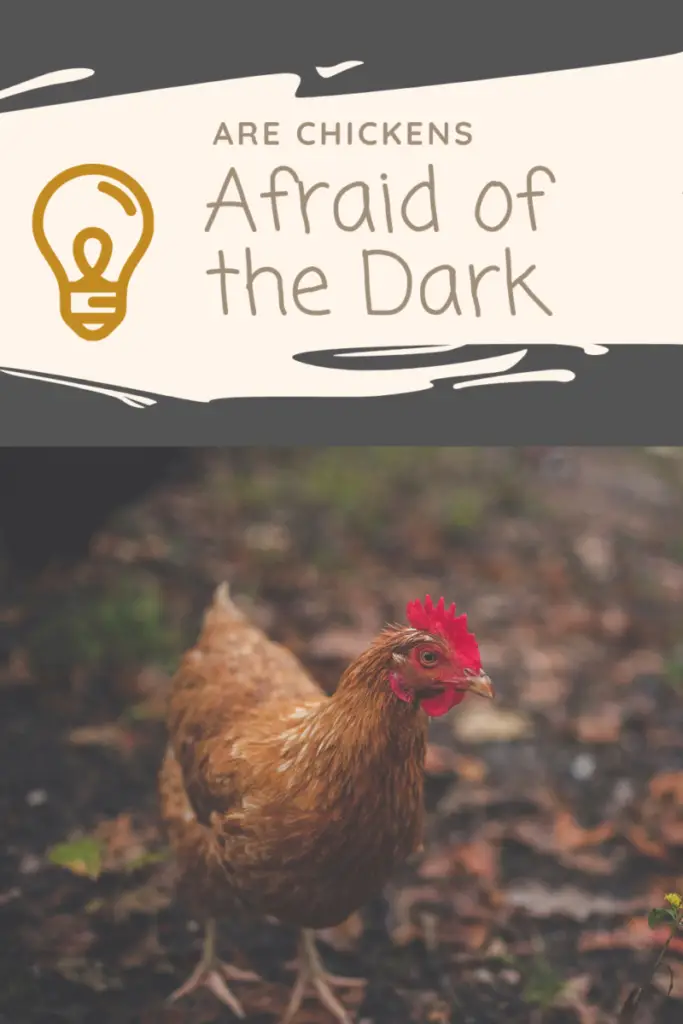
During the decreased egg-laying time in the autumn and winter seasons, hens can go through the molting process. The molting process happens when chickens are around 18 months old, and during this time of molting, they do not lay eggs. Instead, they focus on growing more “adult” feathers.
The molting process lasts between 8 and 16 weeks for young hens, and they will resume egg-laying after this time, once they have new feathers. The process occurs twice a year, normally in the fall and spring for adult chickens, as their bodies prepare for colder temperatures. For adults, the process lasts between 6 and 12 weeks.
The Importance of Food
As chicks are growing, which occurs between 1 and 17 weeks after their birth, they need more nutrients to grow properly. Needing more nutrients means more food to maintain their health and strength as they go into adulthood.
The increase in food is about 5 to 7 grams of additional food each week, but this depends on the breed size. If their bodies do not have the nutrients they need, they cannot lay eggs. Some of the vital minerals they need in their daily diet are:
- Calcium
- Phosphorus
- Salt
- Vitamin D3
Many times, their food lacks the minerals they need for strong bones and eggshells. Being aware of what minerals and vitamins are in the food is the best way to understand what additional support they might need. Keep in mind that calcium and vitamin D3 are two of the most important for healthy chickens.
4. Lack of Calcium and Vitamin D3
The reason calcium is important is that it creates strong eggshells, and vitamin D3 increases the rate that calcium enters the bloodstream. Calcium is important for egg-laying, but it is also important for bone formation and blood clotting, allowing the chicken to cope with wounds. Remember, a healthy chicken means more eggs.
One eggshell contains 2 grams of calcium, and it takes 2 more grams to keep a hen healthy, meaning each day a hen needs at least 4 grams of calcium in their diet. If a chicken is not getting this amount of calcium, they might not lay eggs as they should.
If you notice that your chickens are not laying the normal amount of eggs, or if their eggshells are weak, try increasing their calcium intake. It might be their bodies telling you that they need more calcium.
It is important to note that chicks have different food requirements than laying hens, and they will have different commercial food. Chicks need more protein and less calcium, while laying hens need less protein and more calcium. Do not mix up the feed, or else you might find your chickens not laying eggs.
5. Brooding
Anyone experienced with raising chickens knows about brooding. Brooding describes the period when a chicken wants to hatch eggs and will sit on them for days, which is done regardless of whether the eggs have been fertilized by a roster or not. Some of the signs of a brooding chicken are:
- The chicken not leaving the nest and sitting on the eggs all-day
- The chicken displaying territorial behaviors, such as pecking and biting
- The chicken puffing its feathers to keep the eggs warm
Brooding is the result of maternal hormones starting. The hen’s body is telling her to sit and try to hatch a chick. It will take around 21 days, which is the typical incubation period, for her to stop brooding. If the eggs have been fertilized, chicks will hatch, but she will not lay eggs until it is over.
Stopping Brooding
There are a few ways to try and end a chicken’s brooding. The main way is to cool the chicken down. A hen’s body will get triggered to stop sitting on eggs if she gets too cold to lay on them. Some people also place ice or frozen vegetables in the nest box to decrease the temperature.
A simple way to stop brooding is to place the hens in a brooding box. A brooding box has a wire underneath that allows cool air to flow under, which lowers their temperature and can stop the brooding process. We have one hen that goes broody all the time (her name is Broody) and the way we break her is by dipping her in a tub of cool water. It may take a couple of dips over several days but it will snap her out of it.
It is important to note that brooding can be dangerous for a hen. Brooding hens tend to neglect themselves, and during the summer months, the hens will rarely get off their eggs. The neglect can lead to dehydration and overheating, which is dangerous for hens. During the summer seasons, it might be best to stop your hens from brooding.
If you notice a hen acting more territorial or starting to peck at you, it is probably due to brooding. If a chicken has not been laying eggs, this could be why, especially if you see the same behavior in other chickens. After all, brooding behavior can spread.
6. Illness
Sometimes, chickens get sick. When they do, they tend to stop laying eggs for the duration. Treating illness and other problems is particularly important because seeing distress in other chickens can cause a chicken to stop laying eggs, even if they are not sick themselves. Some symptoms that hint that your chicken is sick include:
- Sneezing
- Nasal Discharge
- Decreased Appetite
- Decreased Eggs
If one individual hen is sick, keeping it separated from the rest of the flock is best to ensure the other hens do not get sick or grow anxious. Normal colds will clear up on their own, but if you notice your hen getting worse and not better after a few days, it is best to contact a vet for antibiotics and quarantine the chicken.
Quarantining a chicken is not just important when signs of illness present themselves. You should also isolate new chickens until you are sure they are in good health. Do not forget that chickens in distress, especially distress caused by a new addition to the flock, can grow anxious and stop laying eggs.
Another thing worth noting is that a well-ventilated coop will help prevent any respiratory issues that can arise from using sawdust or hay as bedding. Similarly, get rid of any mites or lice that get on your hens, looking out for them by scratching or pulling out feathers.
7. Breed
Sometimes, regardless of how healthy and well-nourished your hens are, they will not produce that many eggs. Certain breeds produce more eggs than others. For example, the Rhode Island Red is one of the top egg layers, with 250 eggs per year.
Meanwhile, the Ameraucana chicken tends to only lay about 100 eggs per year. Other breeds, such as Japanese Bantams, might never lay eggs at all.
Each breed also has its own requirements for nutrition, habitat, and other factors that can greatly influence egg-laying rates. In order to ensure your chicken lays eggs, especially a number approaching their maximum, you should learn as much as you can about the individual breeds and act accordingly.
Bonus Reason – Stress
Stress is another major factor in your chicken’s egg-laying. Many things can lead to increased stress levels, from their environment, physical stress, or nutritional stress. This includes the lives of the chickens around them and how they are treated day-to-day.
If a chicken becomes stressed, it will not lay eggs, and a major stress factor in their life can be their coop. If there is a lot of noise from outside predators trying to get in, it can stress them out. Additionally, if their coop is too cold or not well ventilated, it can be stressful. In general, poor living conditions can lead to decreased egg production.
The main reason for coop related stress is if there is overcrowding in the pen, either from too many chickens or not enough room per individual spot. Here are a few of the things to keep in mind when considering coop space:
- There should be 4 square feet of indoor room per chicken.
- There should be at least 5 to 10 square feet of outdoor space per chicken.
- There should also be one nesting box per three hens for them to lay properly.
Additional Causes of Stress
If you notice that one or more chickens are acting aggressively and ripping the feathers out of other chickens, it can stress out all of the chickens in the flock. Separate the aggressive chickens until they settle back down to help ease the tension in the coop.
The addition of new hens can add stress to the flock as well, especially if they are sick, as previously mentioned. Hens that are transported tend to have higher stress rates from the movement as well. When added into the coop, they can show odd behaviors that might upset the other hens.
Stress can stop egg-laying, but it can also stunt the growth of young chickens. When the stress is gone and they have calmed down, they can resume growing, but it can affect egg-laying initially. It is all part of their way of survival.
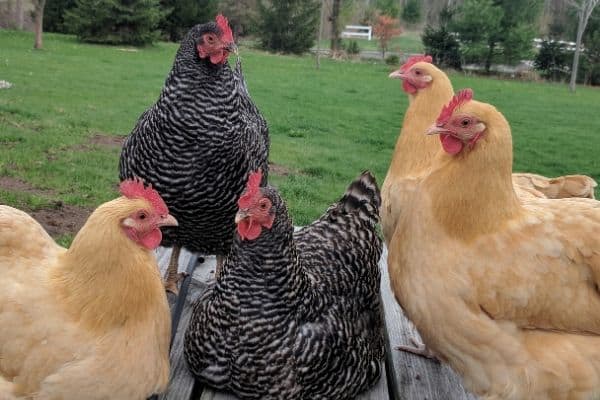
How To Have A Healthy Flock
There are some basic ways to have a healthy and happy flock that lays strong eggs, which includes making sure you have enough nesting boxes. Nesting boxes are where the hens will lay their eggs, so comfort is important. One box should be available for every three hens, with plenty of clean bedding.
Having enough space for all your hens is key to raising an illness-free flock. If the chickens are overcrowded, they can become stressed, and diseases can arise more easily. The requirements for space include indoor and outdoor space, with plenty of room for the hens to roam around. This article talks more about space and whether you can leave your hens cooped up all day or not.
For their indoor pen, keeping it dry can help keep mold and ammonia from forming and making the chickens sick. It will also help keep your hens free from mites and lice. A wet pen from feces and spilled water leads to bacteria growth. Coccidiosis, an intestinal disease, can occur in a wet environment, killing chickens rapidly if it is untreated. Giving them access to a dust bath is also extremely important to help prevent parasites such as mites and fleas.
Food and clean water also deserve to be stressed again. It is not just important for nutrition but for the happiness of your hens. Feed them the correct food and proper amounts according to age and breed to ensure that they remain not only nutritionally healthy but happy as well. After all, both factors affect egg-laying.
Conclusion
Many factors can lead to a decreased amount of egg-laying by your chickens. Understanding their behavior is important for knowing what is wrong with them and being able to identify and address it. So, keep an eye out, make sure to feed them properly, and do your best to provide them with the environment they need to lay eggs.


